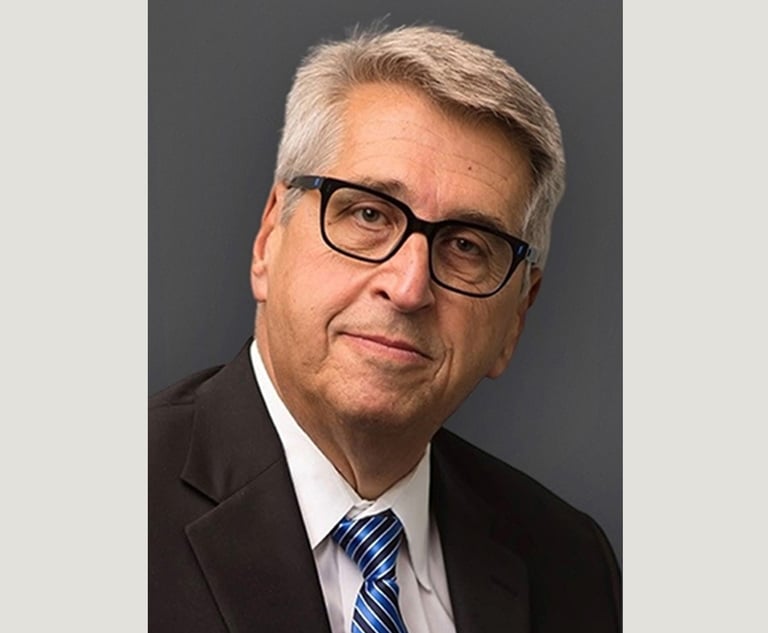Should Lawyers Spend More Time 'Being' and Less 'Doing'?
Years ago, I spent time with a therapist who asked, “What do you want to be, Jim?” This question usually flummoxed me, but I gave it a go. “Well…
April 01, 2018 at 06:00 AM
6 minute read

Years ago, I spent time with a therapist who asked, “What do you want to be, Jim?” This question usually flummoxed me, but I gave it a go. “Well … I want to grow my practice to the point of having a small waiting list, and I want to make XXX dollars per year, raise my kids and I want to take a good vacation every year with my wife…”
He patiently waited me out, without the faintest hint of a smile and then said, “But, I didn't ask what you want to do, I asked what do you want to be?”
Being in the same profession as he, I knew that his question was a way of helping me make a distinction, but in the way of all psychotherapy clients, I resisted, clinging to my conflation of doing and being. I decided to strip down my reply.
“I've always wanted to be a therapist,” I said.
“You mean what you do for a living,” he asked. “Are you referring to the skills you acquired to help others and to make a living? What does it mean 'to be a therapist?' What was it that made you go through the years of sacrifice, to get to where you are now?”
That was a good question. People had quite often asked me why I got into this most peculiar field, and I'd never truly answered their question because it required a complicated answer. I felt tempted to be a wise-ass and ask him the same question, but refrained. I recognized my own resistance. I was there for his help, not to play games with him.
“Was it something you wanted to do, or was it something you wanted to be? What was it about being a psychotherapist that made you put up with all we have to put up to get here?”
I don't think I ever answered the 'to be' question very well, but a good question in therapy causes one to return to it again and again, searching for an answer. And I know it is the searching that reaps the rewards, not necessarily coming up with an answer. Much like the koan in Zen, where the student is asked a nonlogical question such as “In a mountain road with 99 curves, what is the straightest path?”, or, “Who hears?”
I mention my own story because I want to ask the reader: Have you ever reflected on why you became a lawyer? Why did you put up with the rigor of law school, the crushing work weeks as an associate, and all the other hoops to leap through?
To have a profession is a deep and honorable thing. To “profess” means to “speak out,” to express as an expert the years of learning devoted to your field. But beyond acquisition of content, to have a profession means to be steeped in its values and to live them out. In my field, I studied and was mentored in psychotherapy, or literally translated from Greek, “care of the soul.” In the early '90s, the book “Care of the Soul,” by Thomas Moore, went on the national bestseller lists for weeks, answering to a cultural hunger for depth and meaning in everyday life.
It is far easier to acquire knowledge in a profession than it is to absorb and live out its inherent values. In psychotherapy, we find values of nonjudging compassion, understanding, consideration, healing, depth and positive acceptance of life. After 40 years in the profession, I can say that I am somewhat on the path of living these out. Some people are slow learners, I guess.
Now, I realize that I wanted to live those values in everyday life, with a client or not. I saw how those values could carry me beyond the boundaries of my own little ego.
Could we say that in law, there is not only a giant body of knowledge to master, but also a set of values, such as compassion, loyalty, fairness, courage, positive skepticism, authentic humility, and I am sure much more?
It may be that you saw law school as simply a practical matter: “I got a bachelor's in History, and didn't know what to do, so I went to law school.” But, implicit in the decision to pursue a profession (whether you were “called” or simply needed to figure out the next step after college) is the acceptance of a set of values encoded into the practice of that profession.
In this way, you decided not only to practice law, but also to be a lawyer. You are someone who professes and is licensed to represent individuals during some of the most vulnerable times of their lives, like a surgeon sworn to “do no harm,” or a therapist listening nonjudgmentally to a person disclosing their most personal troubles. The profession is the deployment of skills guided by values.
But beyond the work we are paid to do, how can we live in such a way as to express the values of the professions we find ourselves in? What does it mean to be a lawyer in the larger sense of not only the doing, the practice, but the living out of those values? Does it really mean to become the caricature lawyer, the venal, money grubbing weasel, chasing fees? Or, does it mean to be one who takes his stand on the side of what's right?
It may be that if you find your interest in the work lagging, it might be because of too much of the '”doing” of the profession, and not enough of the “being.” This is why it is that at a certain point in life, some lawyers begin to take on a little, or sometimes a lot, of pro bono work, because it brings them back to the ideals and values of what they found exciting at the beginning—that they are not only practicing law but are also “being” lawyers.
Jim Dolan is a lifelong Dallas resident. He is an executive coach working with professionals, specializing with lawyers in the areas of leadership, management, business development and peer relations. He is also a licensed psychotherapist in private practice with four decades of experience.
This content has been archived. It is available through our partners, LexisNexis® and Bloomberg Law.
To view this content, please continue to their sites.
Not a Lexis Subscriber?
Subscribe Now
Not a Bloomberg Law Subscriber?
Subscribe Now
NOT FOR REPRINT
© 2025 ALM Global, LLC, All Rights Reserved. Request academic re-use from www.copyright.com. All other uses, submit a request to [email protected]. For more information visit Asset & Logo Licensing.
You Might Like
View All
From Hospital Bed to Legal Insights: Lessons in Life, Law, and Lawyering
6 minute read

Nondisparagement Clauses in Divorce: Balancing Family Harmony and Free Speech
6 minute readTrending Stories
- 1Trade Wars: Five Tips for Legal Teams to Manage Tariffs and Trade in Trump II
- 2Balancing Attorney-Client Privilege With a Lawyer’s Right to Defend Against Allegations of Wrongdoing
- 3Public Interest Calendar of Events
- 4Sharpening Residential Insurance Fraud Defense Strategies: Insights for Insurers to Mitigate Risk in 2025
- 5Reversal of Fortune: Restoring Owners’ Equity Under New Jersey’s Tax Sale Law
Who Got The Work
J. Brugh Lower of Gibbons has entered an appearance for industrial equipment supplier Devco Corporation in a pending trademark infringement lawsuit. The suit, accusing the defendant of selling knock-off Graco products, was filed Dec. 18 in New Jersey District Court by Rivkin Radler on behalf of Graco Inc. and Graco Minnesota. The case, assigned to U.S. District Judge Zahid N. Quraishi, is 3:24-cv-11294, Graco Inc. et al v. Devco Corporation.
Who Got The Work
Rebecca Maller-Stein and Kent A. Yalowitz of Arnold & Porter Kaye Scholer have entered their appearances for Hanaco Venture Capital and its executives, Lior Prosor and David Frankel, in a pending securities lawsuit. The action, filed on Dec. 24 in New York Southern District Court by Zell, Aron & Co. on behalf of Goldeneye Advisors, accuses the defendants of negligently and fraudulently managing the plaintiff's $1 million investment. The case, assigned to U.S. District Judge Vernon S. Broderick, is 1:24-cv-09918, Goldeneye Advisors, LLC v. Hanaco Venture Capital, Ltd. et al.
Who Got The Work
Attorneys from A&O Shearman has stepped in as defense counsel for Toronto-Dominion Bank and other defendants in a pending securities class action. The suit, filed Dec. 11 in New York Southern District Court by Bleichmar Fonti & Auld, accuses the defendants of concealing the bank's 'pervasive' deficiencies in regards to its compliance with the Bank Secrecy Act and the quality of its anti-money laundering controls. The case, assigned to U.S. District Judge Arun Subramanian, is 1:24-cv-09445, Gonzalez v. The Toronto-Dominion Bank et al.
Who Got The Work
Crown Castle International, a Pennsylvania company providing shared communications infrastructure, has turned to Luke D. Wolf of Gordon Rees Scully Mansukhani to fend off a pending breach-of-contract lawsuit. The court action, filed Nov. 25 in Michigan Eastern District Court by Hooper Hathaway PC on behalf of The Town Residences LLC, accuses Crown Castle of failing to transfer approximately $30,000 in utility payments from T-Mobile in breach of a roof-top lease and assignment agreement. The case, assigned to U.S. District Judge Susan K. Declercq, is 2:24-cv-13131, The Town Residences LLC v. T-Mobile US, Inc. et al.
Who Got The Work
Wilfred P. Coronato and Daniel M. Schwartz of McCarter & English have stepped in as defense counsel to Electrolux Home Products Inc. in a pending product liability lawsuit. The court action, filed Nov. 26 in New York Eastern District Court by Poulos Lopiccolo PC and Nagel Rice LLP on behalf of David Stern, alleges that the defendant's refrigerators’ drawers and shelving repeatedly break and fall apart within months after purchase. The case, assigned to U.S. District Judge Joan M. Azrack, is 2:24-cv-08204, Stern v. Electrolux Home Products, Inc.
Featured Firms
Law Offices of Gary Martin Hays & Associates, P.C.
(470) 294-1674
Law Offices of Mark E. Salomone
(857) 444-6468
Smith & Hassler
(713) 739-1250







